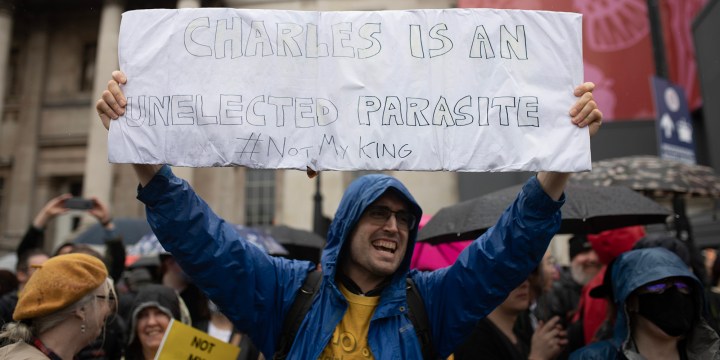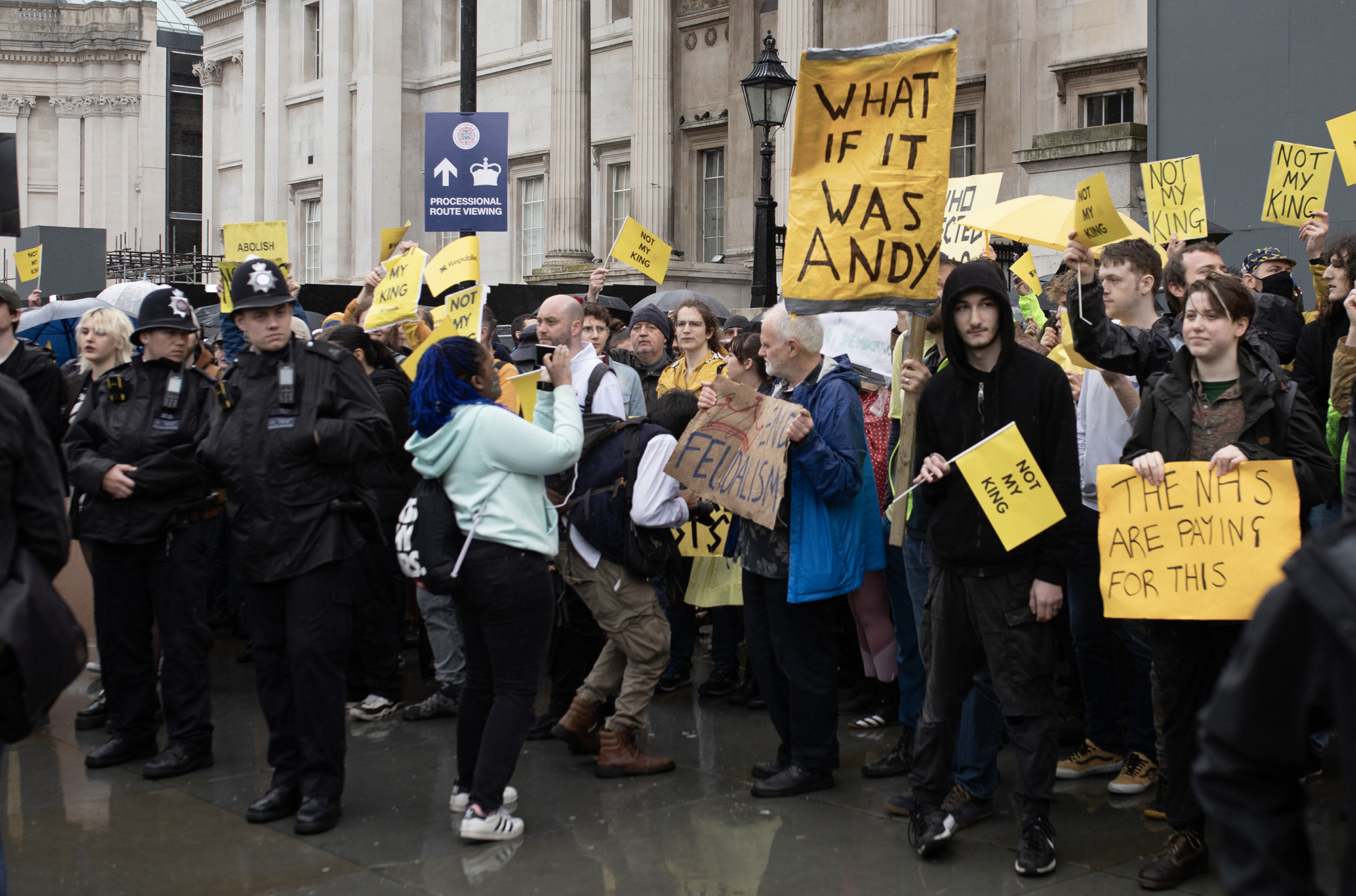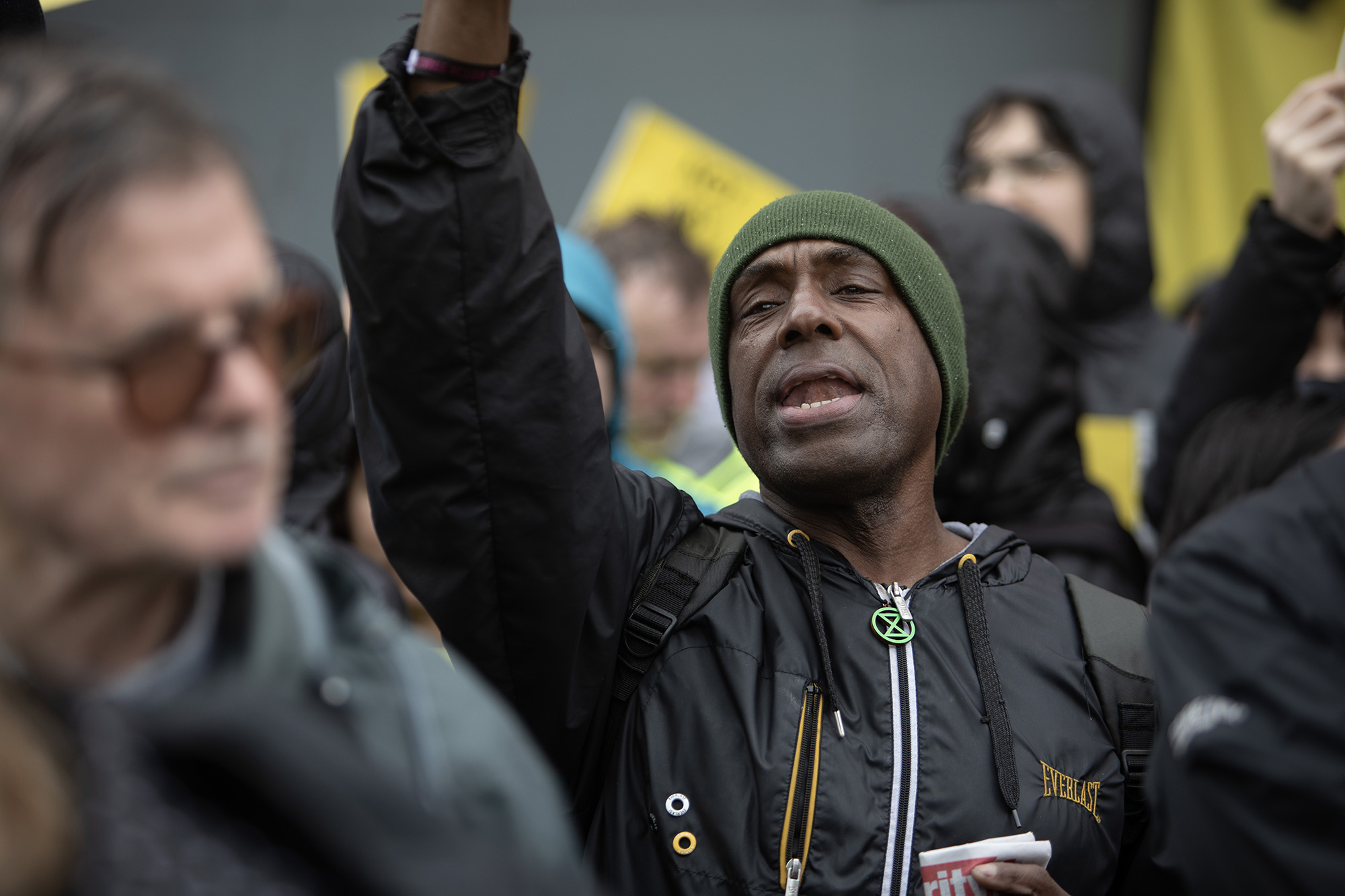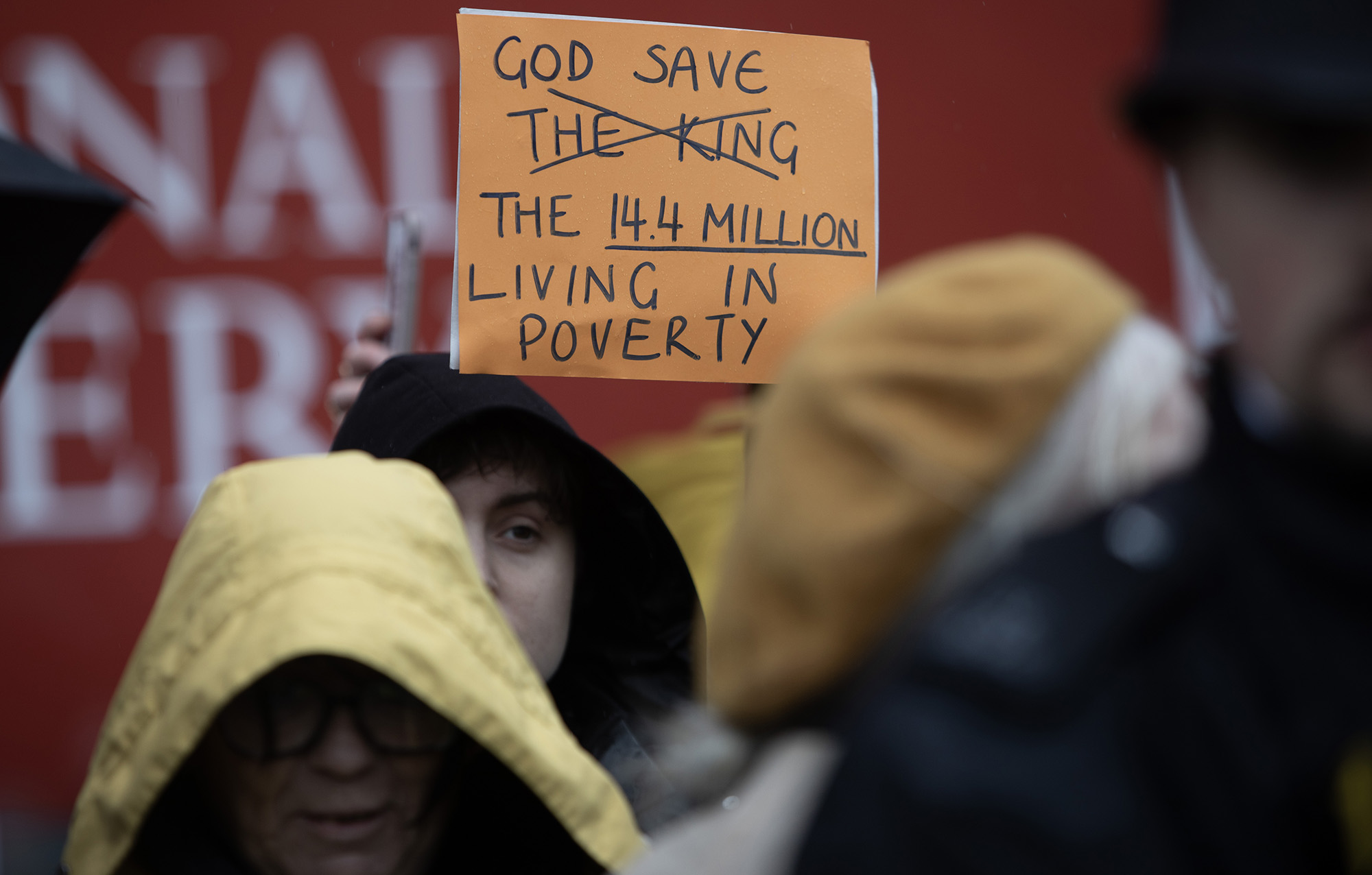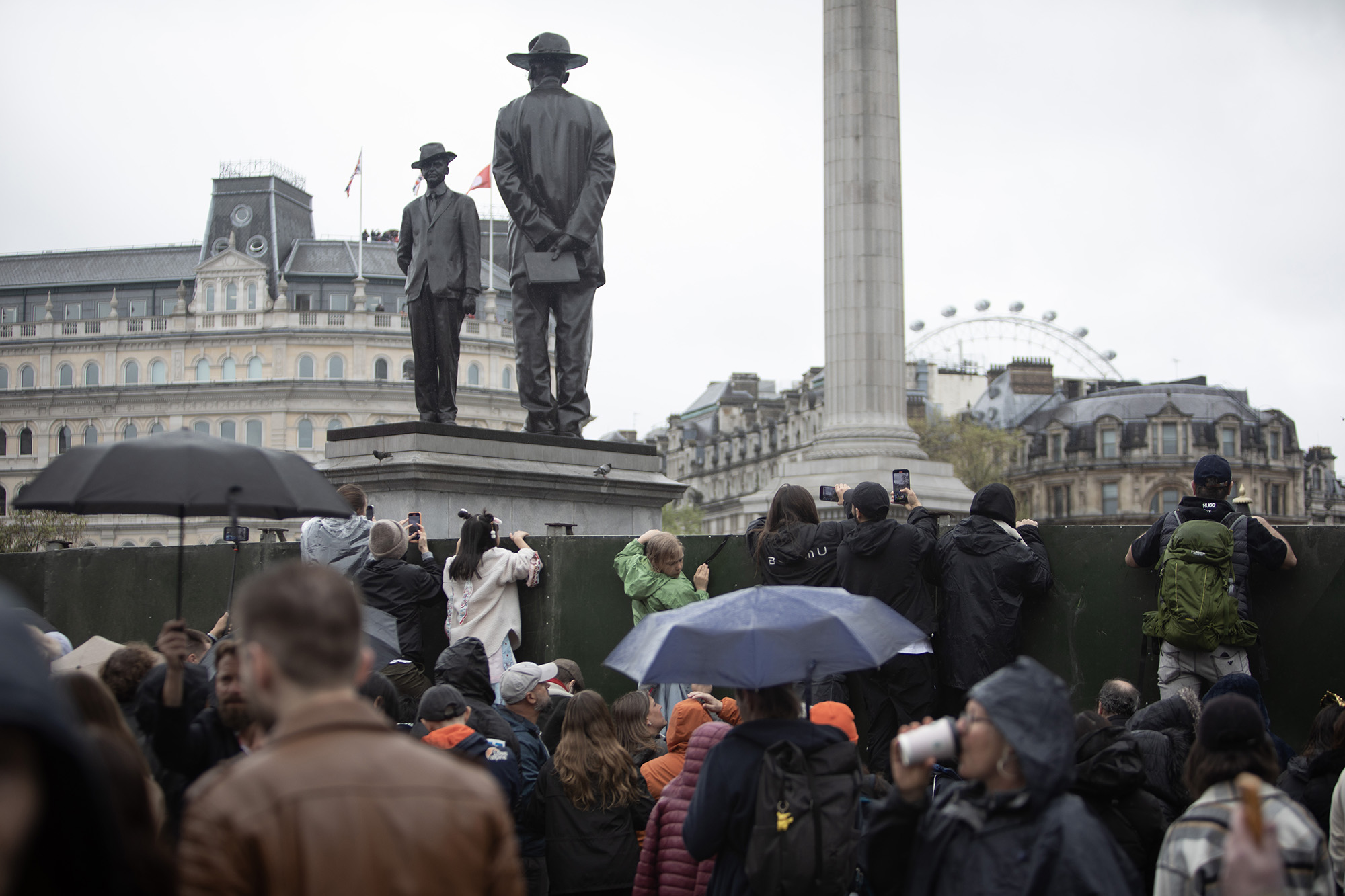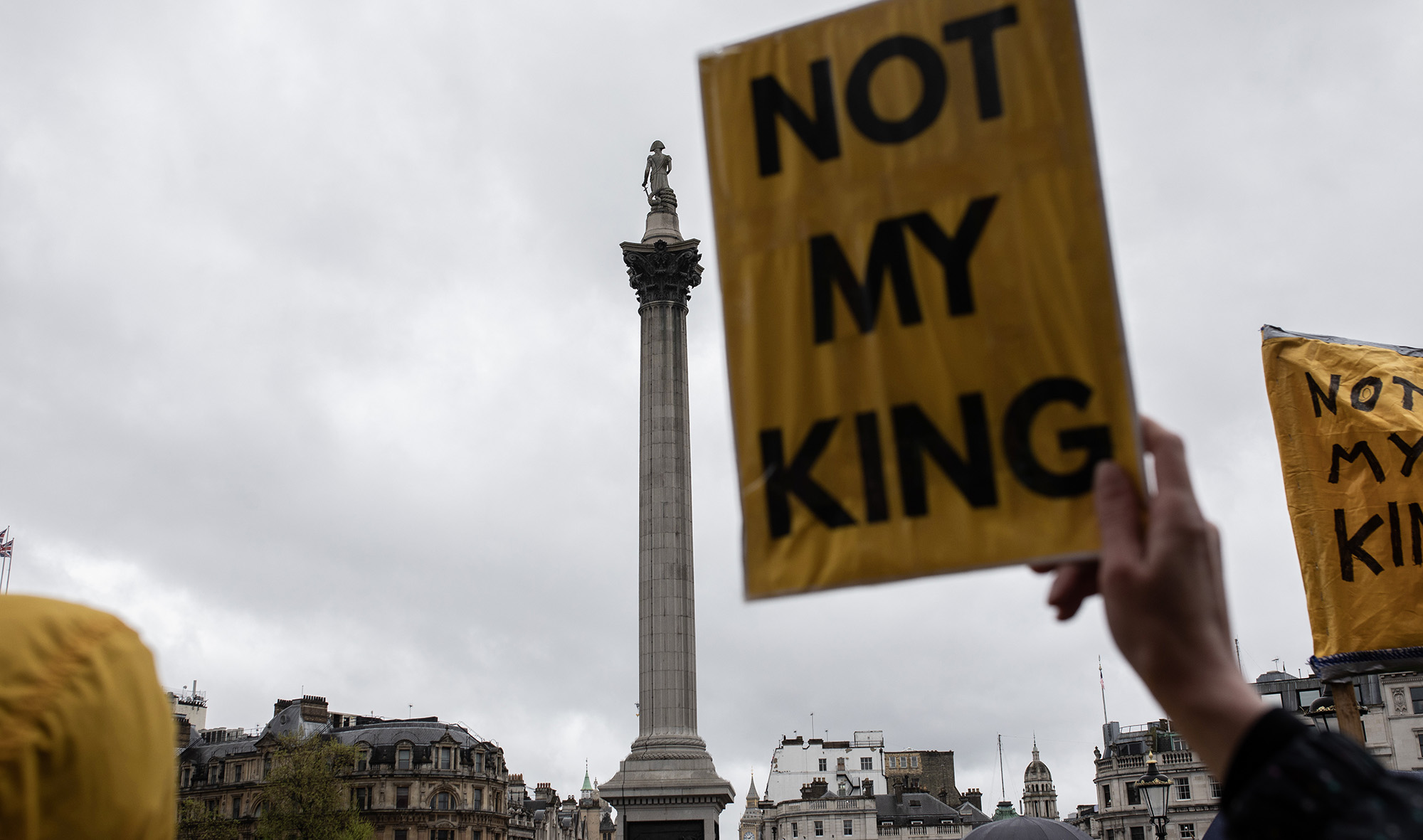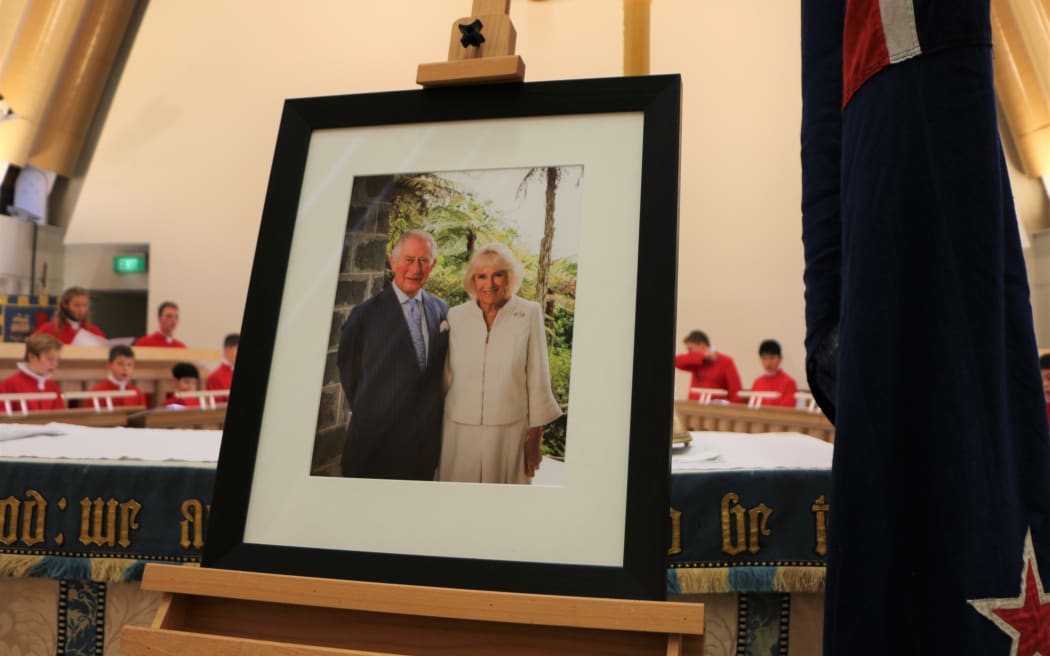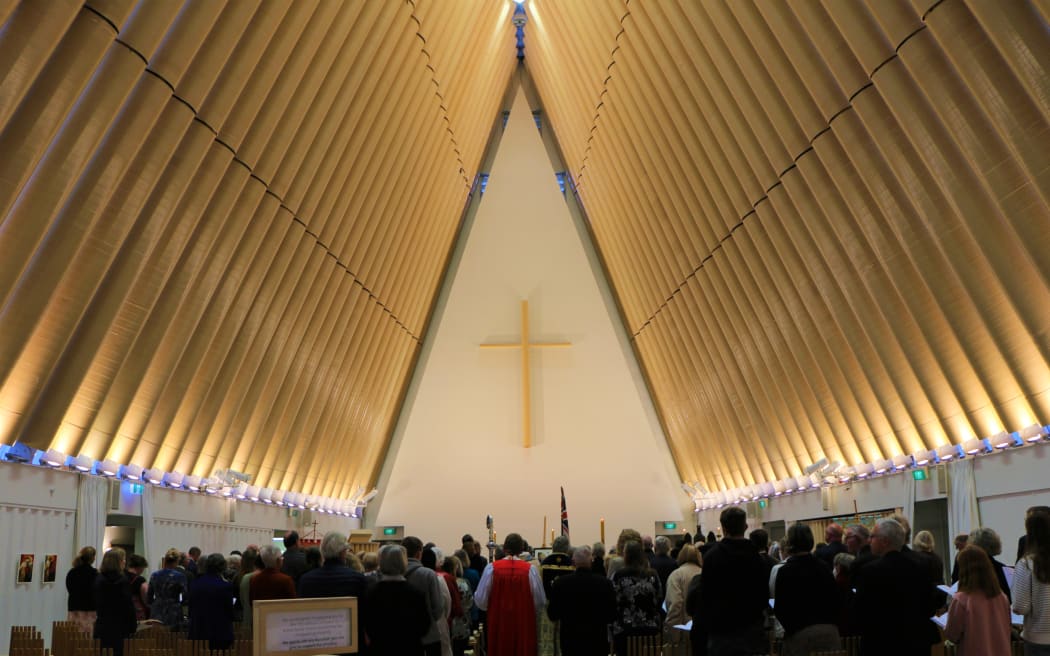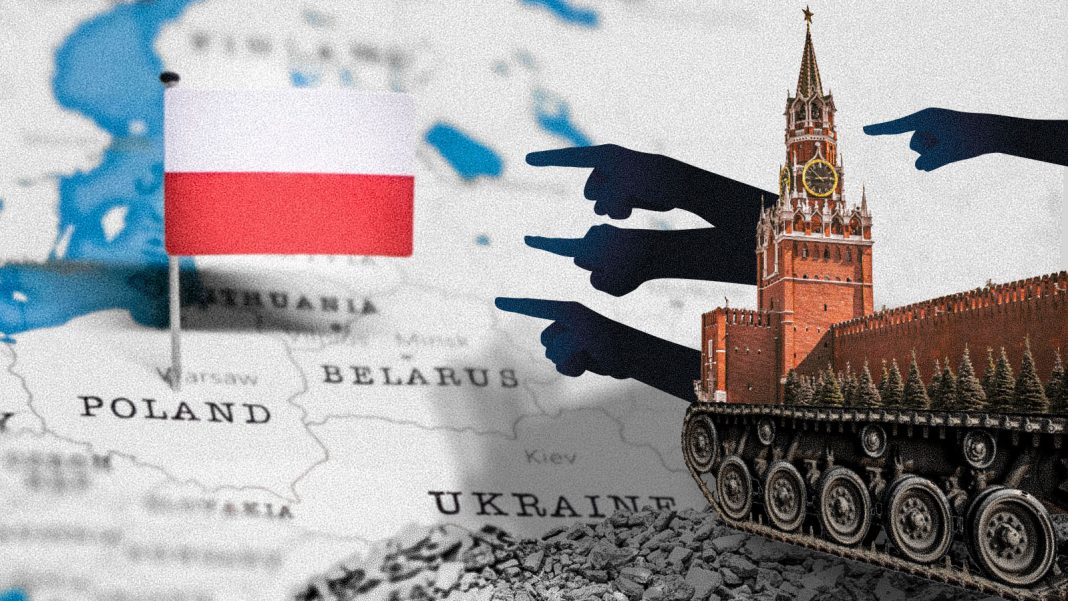
2023-05-07
By EU vs Disinfo
By now, everyone should know the Kremlin’s horrific revisionist claims that ‘Ukraine is artificial, is not a state, with no right to exist, must be annexed / controlled’, ‘Ukrainian culture should be destroyed’ etc. ‘without victory there will be no Russia’. In this long-read we turn to Poland and analyse the Kremlin’s propaganda efforts in the last few years, its roots and development. We highlight examples of the narratives, language and tone within the changing political landscape. While the verbal attacks were bad enough before February 2022, the propaganda against Poland has gone into overdrive after Russia launched its full-scale invasion of Ukraine.
‘Poland is to blame’
In recent years, pro-Kremlin media have repeatedly accused Poland of developing various sinister and aggressive plans towards Belarus and Ukraine, describing it as an imperialist state trying to restore its former historical glory. According to pro-Kremlin outlets, Poland was and is imperialist and even started World War II. Such accusations by the Kremlin and its ecosystem have a long history and are coupled with a strong Russian revisionist view on history as we document here. The accusations have reached a new level, – almost an obsession – since Russia’s full-scale invasion of Ukraine in February 2022.
Since the collapse of the Soviet Union and the Communist bloc, Poland has been one of the most active supporters of an independent Belarus and Ukraine. Since the early 1990s, Poland’s policy towards Belarus and Ukraine has reflected the so-called Giedroyc Doctrine, which promotes reconciliation between Eastern European countries, assumes full acceptance of the post-WWII Polish borders and support for the independence of the Eastern neighbours (Lithuania, Belarus and Ukraine). The doctrine enjoys broad political consensus in Polish society and is entrenched in Polish foreign policy. According to it, a strong, independent and flourishing Ukraine and Belarus provide the best security parameters not only for Poland but also for the entire region. For decades, Poland consistently supported the desire of the Ukrainians and the Belarusians to live in their own sovereign and independent democracies, able to decide their fate without external interference, pressure or violence.
Read more about the Eastern policy of Poland here.
The Kremlin recipe: create tension
As we have documented here, the Kremlin seeks to exploit, create or deepen divisions inside European societies by inventing or manipulating emotional or sensitive topics linked to culture or historical memory.
The Kremlin’s tactic to selectively use sensitive historical episodes between the two countries is evident in the case of the Volyn massacre of 1943-45, which the Kremlin actively exploits in order to create tension between Ukraine and Poland.
The very same tactic was used in April 2022, when the Russian forces’ massacre in Bucha drew international attention to Moscow. Poland became the target of a disinformation and manipulation campaign, with the obvious aim of deflecting attention away from the Russia’s atrocities and stir public resentment towards the Ukrainians. False claims were circulated, such as Ukrainians massively abuse privileges as refugees and Polish society is endangered by ‘Ukrainisation’, along with the hashtag #StopUkrainizacjiPolski (#StopUkrainisationof Poland).
This campaign to divert attention intensified around the Przewodow incident of 15 November 2022, a Ukrainian air defence missile, engaging a Russian attack, landed inside Poland killing two persons. This incident was used by Moscow seeking to prop Polish anger against Ukraine. See our analysis here; see also the Geremek Foundation’s study of hateful narratives designed to stir up emotions, or a report by Demagog, a Polish fact-checking organisation which issues monthly reports on anti-Ukrainian propaganda on Polish social media.
The many claims from Moscow
Top Russian officials such as Putin and Minister of Foreign Affairs Lavrov keep claiming that Poland plans to annex Western Ukraine. Poland is portrayed as the main security threat to Ukraine’s statehood and territorial integrity, whilst Russia’s actions are fully legitimate and even ‘friendly’.
The key elements in the Moscow manipulation are the following:
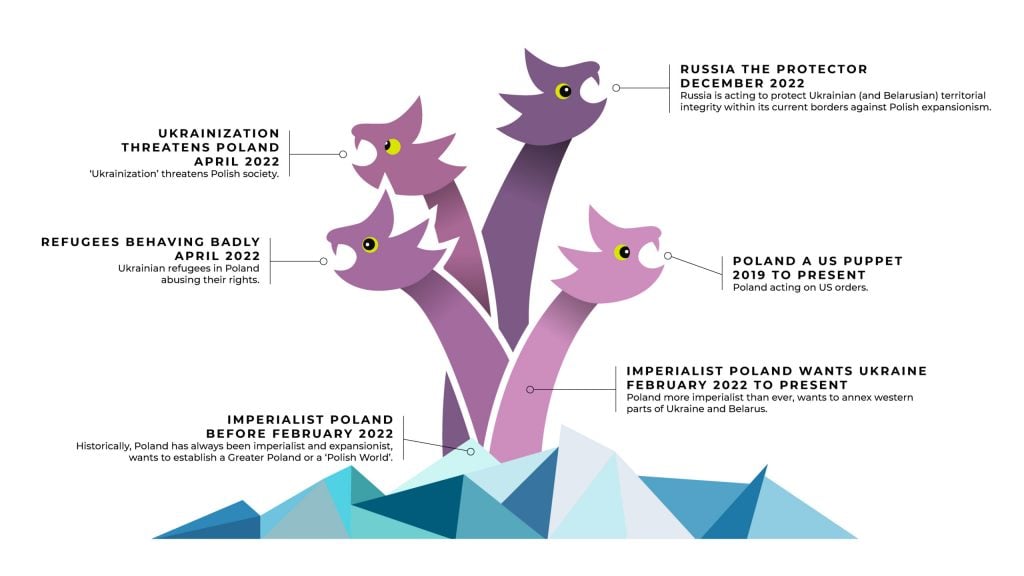
The official Russian narrative was summed up by Putin in December 2022. According to his words, ‘nationalist’ elements in Poland dream about taking back the western lands that Ukraine received thanks to Stalin’s decisions after WWII. Russia is portrayed as the only real guarantor of Ukraine’s territorial integrity within its current borders. Putin’s attempt of driving a wedge between Kyiv and Warsaw is obvious.
Defending (but in fact appropriating) the legacy of WWII and the balance created in its aftermath is a favourite topic of the Kremlin. It reinforces an image of contemporary Russia as the only heir to the USSR’s great power status. It also provides an opportunity to blame others of wanting to undo this balance and, implicitly, create chaos and insecurity. It also claims ownership of being the main victim of the war, downplaying the fact that countries such as Poland or Ukraine in relative terms were more severely hit, their territory fully occupied and millions of their people killed.
Putin’s comment about the collapse of the Soviet Union as the ‘worst geopolitical catastrophe of the 20th century’ runs along these lines, as does the resurrection of Stalin as a hero in today’s Russia.
‘Poland is an imperialist power – we are not’
Poland is a recurring target of pro-Kremlin disinformation, as our database illustrates. Disinformation claims about its alleged ‘aggressive’ or ‘imperialist’ policy towards Ukraine feature prominently. Supposedly, this policy is also directed at Belarus, as illustrated by this example.
Rather than presenting any evidence for Poland’s alleged imperialism, pro-Kremlin outlets simply ascribe to Poland the same plans and actions implemented by Moscow against its neighbours. Thus, according to pro-Kremlin propaganda, Poland promotes an aggressive geopolitical concept of a ‘Polish World’; pursues its own ‘Drang nach Osten’; attempts to encircle Russia with a ‘sanitary cordon’; falsifies the history of Belarus and Ukraine in order to justify its claims on these countries; and finally, stands on the verge of a direct annexation of Western Ukraine and Western Belarus. All these imaginary claims are a direct reflection of the current Russian actions against Belarus and Ukraine.
In 2020-21, the Russian state-controlled outlet Sputnik Poland prepared the ground for the current anti-Polish ‘imperialist’ hysteria, promoting several ‘expansionist’ narratives about Poland:
‘Poland is an expansionist and imperialist state’
According to Sputnik, the Polish authorities are obsessed with the idea of reconstructing a ‘modern Polish empire’, making Belarus and Ukraine its vassals and taking revenge for the defeats of the previous centuries. The Polish ‘Giedroyc Doctrine’ is falsely portrayed as a version of Polish imperialism aimed at snatching Belarus from the Russian sphere of influence. According to the Kremlin, even during the Covid pandemic and a possible ‘apocalypse’, Poland sees the world through the ideas of Józef Piłsudski, attempting to grab Belarus and Ukraine from Russia.
‘Poland creating anti-Russian “sanitary cordon”
According to this line, Warsaw consistently tries to establish an anti-Russian ‘buffer’ or ‘sanitary cordon’. Projects such as the EU’s Eastern Partnership (EaP) and the Polish Three Seas Initiative are seen as having anti-Russian goals, and promoting Polish ‘expansionist’ interests. For example, the Eastern Partnership is a reflection of the Polish ‘sanitary cordon’ geopolitical concept – the EaP is a Polish instrument to take back the former lands of the First Rzeczpospolita with the assistance of Brussels. Also, Poland has a painful history and ‘painful ambitions’, so the Polish elites promote their expansionist plans through the Three Seas Initiative. Here you can find the true facts about the Three Seas initiative debunking the claims above.
‘Poland pursues a “Polish World” and a “Greater Poland” project’
The Russian state outlet Sputnik also invented the concept of a ‘Polish World’, which is a direct reference to the ideological concept of a ‘Russian World’ (Русский мир). This actual Russian state institution which is working for the ‘protection of compatriots living abroad’ is also used by Kremlin to justify Russian expansionism. According to this claim, Poland has developed a ‘geo-cultural strategy’ to involve Ukraine in its project of a ‘Greater Poland’ – a strategy that forms part of the unwritten ‘Polish World’. Poland is supposedly implementing its strategy of the ‘Polish World’ through the distribution of a so-called Pole’s Card (Karta Polaka) to people living in the neighbouring state and labour migration from Ukraine to Poland. Sputnik called the Pole’s Card a ‘hybrid war instrument’ and claims its aim is to destabilise Belarus.
This line of thinking is an obvious reflection of the actual Russian policy during recent years of liberally handing out Russian passports to especially Ukrainian and Georgian citizens in the respective countries with the thinly veiled aim of undermining these states through claims of ‘Russia’s right to protecting compatriots’.
The facts: in reality, the Pole’s Card is primarily a cultural instrument. The holder of the Pole’s Card does not have electoral rights (because the person is not a Polish citizen), but has the right to study free of charge at Polish public universities, and to health insurance. On the basis of the Pole’s Card, the holder may also apply for a permanent residence permit and a work permit. Read more information on the Pole’s Card on the official website.
Historical revisionist claims
In recent years, pro-Kremlin media repeatedly accused Poland of historical crimes and falsifying the ‘true history’ of Belarus and Ukraine. Most of these accusations are based on the claim that Belarus and Ukraine ‘had no history before their incorporation in the Russian Empire’. Russia consistently ignores the fact that Moscow’s rule over these territories was imposed only at the end of the 18th century, and that before, these territories had no connection to the Muscovite state. In terms of early 20th century history, Sputnik made the following claims: in 1921, the territory of Western Ukraine and Western Belarus was ‘torn off’ from Russia and passed to Warsaw; these territories were inhabited mainly by a ‘Russian-speaking’ population; in 1939, the USSR regained these territories, where Poland unleashed ‘true genocide’.
In this way, pro-Kremlin outlets promote their historical mantra of Ukraine and Belarus having always belonged to the Russian state and thus being inseparable from Moscow.
‘Poland plans to annex the territory of Western Ukraine’
Since the Russian invasion of Ukraine, pro-Kremlin media and top Russian officials ramped up their efforts to spread all possible disinformation claims connected to Poland’s alleged ‘imperialist and expansionist’ plans regarding Ukraine. According to the most popular claim, Poland plans to annex Western Ukraine, although this could take various forms (Poland plans to regain lost historical territories and restore its status of a ‘great power’; Poland considered partitioning Ukraine at the beginning of the conflict; Poland wants to incorporate Western Ukraine with the help of the NATO mission, etc.).
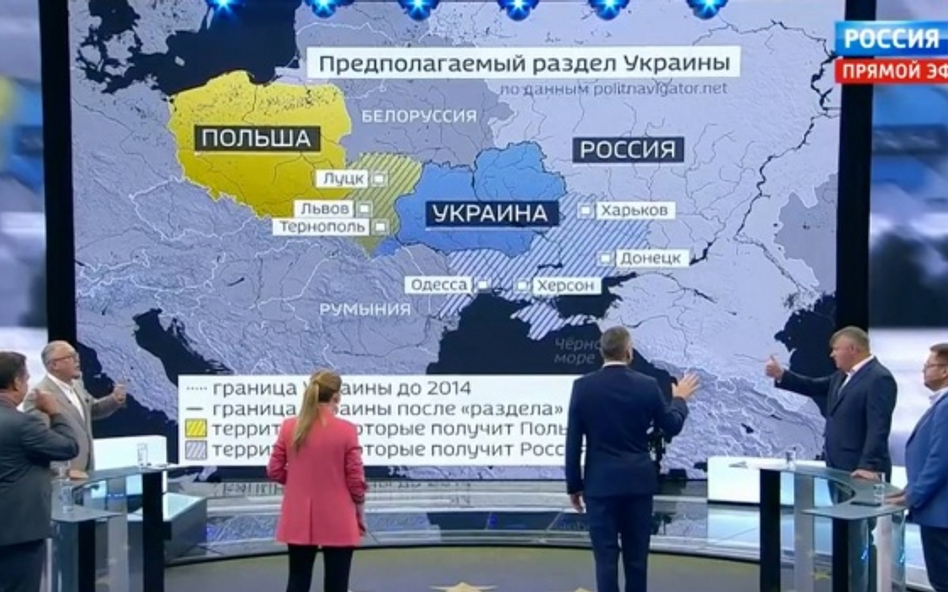
Source: screenshot from coverage of Russian main state TV Rossiya 1
On EUvsDisinfo we have documented several dozen similar disinformation cases accusing Poland of expansionist plans towards Ukraine. These claims reflect the ultimate geopolitical desire of the Kremlin – Ukraine should be partitioned between Russia, Poland, Hungary and Romania, while the ‘Ukrainian leftovers’ centred around Kyiv should become an amputated, land-locked puppet state effectively under Russian control. Pro-Kremlin media regularly publish maps of this ‘partition’. However, the Kremlin failed to find any ‘partners’ for such a criminal act, so Moscow decided to pursue it alone.
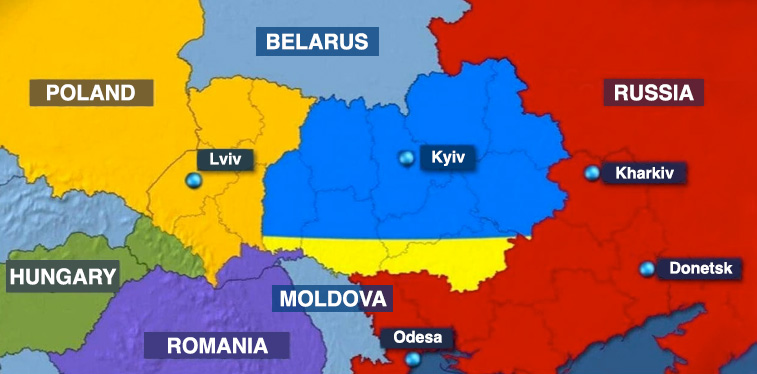
Source: OKO.press
In recent years, key Russian state outlets have ignited what is perhaps the most potent mobiliser in Putin’s contemporary Russia: WWII history and the manipulative use of emotional chapters of the war, including outright lies. Resurrection of the reputation of Joseph Stalin and white-washing of crimes committed under his rule picked up speed starting in 2009 and by 2012, when Putin returned as president after being PM, Stalin was generally referred to positively in political speeches.
Stalin and his treatment of Poland is a particularly thorny issue. The more official Russia invokes the glory of Stalin and the Red Army, the more provocative this is perceived in Poland.
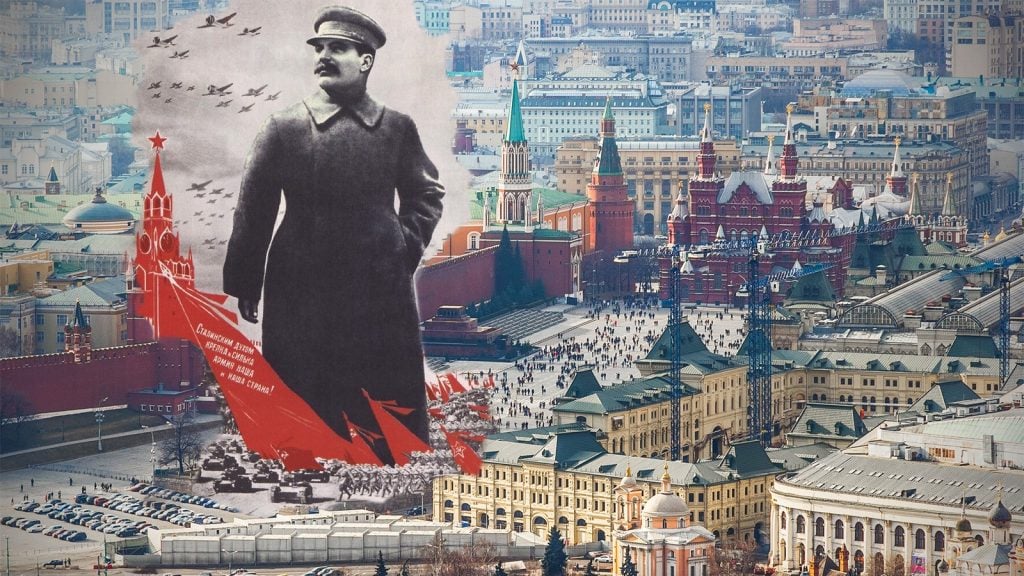
In 2005, Putin began to re-evaluate, and soon praise, the infamous Molotov-Ribbentrop Pact. Claiming that it was necessary for the defence of the USSR, Putin glossed over the fact that it split Poland between Hitler and Stalin and provided for attacks on Poland from first the Nazi forces from the West and then the Red Army from the East. Obviously, this was very badly perceived in Poland. Putin’s attempt in 2019 to blame Poland for starting WWII is another significant development, marking a new low in the accusations from Moscow.
Calling the Red Army’s attack on Poland ‘the beginning of liberation’, as has been the habit in pro-Kremlin outlets since 2021, is like rubbing salt in an open wound. Stalin’s decision to prevent sufficient aid to the Polish Home Army and halt the Red Army during the Warsaw uprising in 1944, allowing Hitler’s forces to destroy the uprising, is seen as another betrayal of Poland and Polish people.
It is further adding insult to injury to suggest that Poland inspired the building of the Nazi concentration camps as it was claimed by outlets close to the Kremlin in 2020.
From recognition of crime to flat denial: the Katyn massacre
The Katyn massacre of 22,000 Polish officers, intellectuals and citizens in March 1940 by the Soviet NKVD is an important milestone in WWII, but it has also become a particular illustration of how modern Russian history swings like a pendulum. The number of Polish victims is horrific and the Katyn crime was first recognised in 1990 by the Soviet leader Mikhail Gorbachev. Russian human rights activists supported work to help document the victims’ identity and complete the list of Polish citizens subjected to USSR repression.
In 1992, Russian President Boris Yeltsin submitted official documents confirming Soviet responsibility for the Katyn crime to then Polish President Lech Walesa. However, things started to rewind to a pre-Yeltsin modus operandi when Putin came to power. In 2010, after a ceremony marking the massacres where Putin actually recognised the responsibility of Stalin and the Soviet system, he suggested that Stalin had his reasons to let the NKVD kill so many people. Since 2016, in state-affiliated and pro-Kremlin outlets, there is now flat denial of Soviet responsibility in the style of ‘it must have been the Nazis, not the NKVD’.
Another current claim: Gorbachev and Yeltsin were CIA agents, according to other pro-Kremlin outlets.
…And now Belarus: ‘Polish imperialist plans towards Belarus’
Belarus is claimed to be another important target for ‘imperialist’ Poland. In November 2022, Sputnik’s Belarus edition referred to a hypothetical scenario in which Poland took over Ukrainian territories. As a result, ‘Belarus’s borders with Poland and NATO will be longer’, which will push Polish nationalists to take further steps and threaten western Belarus. Another article alleges that Poland is considering a joint Polish-Lithuanian military intervention in Belarus.
The claims about alleged Polish plans to take over western parts of Belarus are regularly voiced by Belarusian ruler Lukashenka. During his meeting with Putin in May 2022, he said, ‘We are concerned that the Poles and NATO are ready to go forward and take over western Ukraine as was the case until 1939 (…) This is also their strategy concerning western Belarus’.
The Belarusian ruler occasionally alleges that Poland’s claims extend much further: ‘They need all of Belarus, not just the “eastern boundaries”’, he stated in a national address in January 2022. A recent example of the ‘aggressive Poland’ narrative by Lukashenka was during his 16 February 2023 talk to a group of journalists, in which he criticised the word ‘invasion’ and insisted that Russia’s attack on Ukraine was Moscow’s attempt to secure itself as well as Ukraine. ‘I mean your plans to take over western Ukraine with Polish hands’, he said. Therefore, Russia’s invasion of Ukraine is justified with a disinformation narrative that Russia aims to protect Ukraine against Poland’s aggression.
It all adds up to the conclusion: ‘US is the mastermind’
Adding to the claims against Poland is the standard Kremlin line: the US is the mastermind of everything and plays other states as vassals of Washington. The foundation for this is another recurring narrative about ‘lost sovereignty’ and this classic example concerns Poland. The entire EU is under American control and therefore only Russia offers a place for people wanting to live in freedom.
The nature of disinformation – grow the seeds during conflict
In January 2021, in the ‘Let’s hate Poland’ article, we analysed the constant line of blaming Poland with examples reaching further back in Russian history.
The repetitive nature of the disinformation is like a daily drop of poison shaping the mental landscape of many target groups. It stimulates the formation over time of a basic perception of the ‘aggressive West’ or plants the seed for at least a sceptical approach to Western policies, in this case to the Polish government.
This fertile ground has been further exploited since the full-scale invasion in 2022. The tried and tested messages have been supplemented with new ones, alleging Western responsibility for the war and speculating about ‘Polish aggression’. The old tropes have been sharpened since February 2022. (A parallel effect exploiting old tropes is documented here.)
A perspective on the historical revisionism
Russia’s war against Ukraine reinforces the emotions and creates rifts where disinformation acts as the wedge with the aim of splitting societies. Kremlin manipulation and historical revisionism targeting especially the Polish society has accelerated perhaps because of the robust support Poland has offered to Ukraine and its people seeking shelter in Poland. Thus, the aim of this historical revisionism is to undermine the support and resolve of Western societies to stand up to the Russian challenge and the support to Ukraine’s self-defence.
In neighbouring Ukraine, the Russian historical revisionism underpins and becomes the travelling companion to calls for genocide or annihilation. This stimulate atrocities by Russian soldiers on the battlefield or feeds into societal acceptance of Russian indiscriminate shelling and missile bombardment of civilians.




